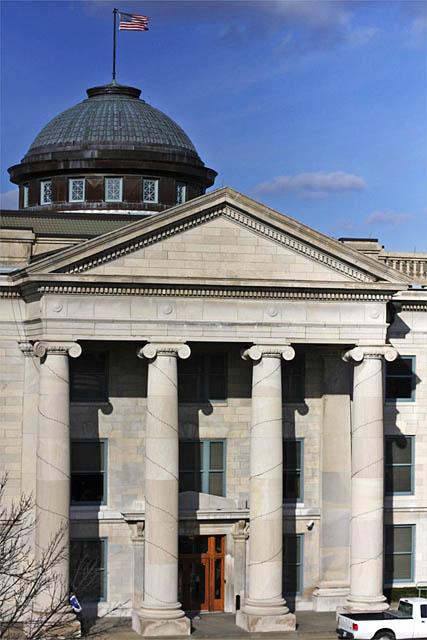
On Oct. 2, Columbia and mid-Missouri residents assembled at the Boone County Courthouse for a rally and 5k march to support combating climate change. Mid-Missouri Peaceworks facilitated the demonstration to shed light on its two main initiatives: Vote for the Climate and its proposition for Columbia to generate 100% renewable energy for water and light utilities.
The Vote for the Climate campaign urges constituents across the nation to vote for candidates with environmentally focused platforms, educating the public on where candidates stand and calling upon candidates to uphold their environmental promises.
“It’s tragic that we’ve allowed corporate profit makers to control the political process,” Mid-Missouri Peaceworks director Mark Haim said. “[We are] urging politicians to stand up to the fossil fuel industry.”
The Mid-Missouri Sierra Club, a partner organization of Peaceworks, has endorsed several Missouri candidates for the Nov. 8 election who it believes will fight for climate action. At the demonstration, representatives from the Sierra Club distributed leaflets detailing their supported candidates and information on voting protocol in Missouri.
“The Sierra Club endorses candidates for election who will fight for climate action and our democracy,” said Carolyn Amparan, chair of the Mid-Missouri Sierra Club and Columbia’s Climate and Environment Commission. The Sierra Club has endorsed Trudy Busch Valentine for Senate, along with Cori Bush, Trish Gunby and Emanuel Cleaver for the House of Representatives.
The second purpose is to draw attention to Peaceworks’ ongoing attempt for Columbia’s water and light industry to generate 100% renewable energy by 2030. Peaceworks, along with other Mid-Missouri environmentalist groups, agrees this is essential to reduce net emissions by the end of the decade. The deadline of 2030 is believed to be crucial by climate experts, as The United Nations’ Paris Agreement established 2030 as the goal for emissions to be reduced by 45% in order to keep global warming under 1.5°C.
“We shouldn’t be investing another dime in fossil fuel exploration,” Haim said. “We need to phase out fossil fuels, not invest in their infrastructure.”
Peaceworks director Mark Haim
Roughly three years in the works, progress has been touch and go. According to the Columbia Climate and Energy Commission, members of Columbia’s community submitted over 2,800 signed petitions and 55 letters of endorsement to the Columbia City Council in the year after an investigation into the feasibility of the renewable energy initiative conducted by Siemens—a manufacturing company focused on sustainability. According to Haim, the majority of the City Council is in favor of the proposition but is unsure if it is feasible. Haim believes the council’s uncertainty has stalled the initiative into a state of perpetual revision and investigation.
Haim is tired of waiting. “This is a critical issue that affects everyone”, Haim said, advocating for Columbia’s switch to renewable energy.
Siemens believes it to be possible. By its estimates, Columbia could transition to renewable energy without major disruption to consumers by 2030. To actualize this plan would call for electrical substitution, or the process of phasing out infrastructure powered by fossil fuels and replacing it with renewably sourced alternatives such as solar energy, wind energy and hydropower.
“Appliances will continue to be operated like they currently are; it’s just the source of energy that will change,” Haim said on what electrical substitution would look like for Columbia residents. Although exact figures would vary, Siemens, Haim, and the Sierra Club estimate the transition to renewable energy would cost Columbians slightly more, but they feel that the long-term costs of unaddressed climate change will outweigh the immediate costs of electrical substitution.
Peaceworks and its associated organizations are optimistic for the future of their initiatives in Columbia, but Haim said they feel optimism is not enough.
“We’re going to keep working on it,” Haim said. “We’re not just going to hope.”
Local activist Maile Barry said she believes the time for hope alone has long passed. At the rally she delivered a speech centered around her frustrations of growing up amid what she refers to as a ‘climate catastrophe.’
“The time for action is now, it was yesterday, it was last year,” Barry said. “There is no more time left for debate. We have the solutions available to us. Now is the time to implement them.”
local activist maile barry
Edited by Emma Flannery | [email protected]
Copy edited by Sam Acevedo and Jacob Richey